Could Earth be Knocked Out of Orbit?
This week, you pit your wits against the Naked Scientists team and challenge us to answer your science questions. Is there an evolutionary reason why humans have rhythm? Do people sneeze in their sleep? Why do crabs walk sideways? And how do stinging nettles sting? Chris Smith, Carolin Crawford and Ginny Smith join Kat Arney get their teeth into your conundra, and take a closer look at the stories hitting the headlines, including a sieve that separates oil from water, how you can sniff happiness in sweat, and the Hubble telescope celebrates its 25'th birthday...
In this episode

How far have I travelled?
We put Paul's question to astronomer Carolin Crawford...
Carolin - Well, there are a number of things you can take into account here, Paul. I mean, the first one of course is that the Earth is spinning around the sun, at about 30 km per second. And then the sun is also wheeling around the galaxy at about another 220 km per second. So, if you added all that up together over about 45 years, we reckon you've travelled at least 350 billion kilometres. If that's not enough, just another thing to add into the mix, our galaxy also doesn't stay still. We're moving towards the local Andromeda galaxy at something like 400,000 km an hour. So, if you're about to add that in, that's about over 500 billion kilometres in your lifetime.
Carolin - I bet you didn't realise you're an interstellar traveller.
Paul - Well, there you go.
Kat - Excellent! Thank you very much, Paul.
Paul - Thank you.

Why do stinging nettles sting?
We put this question to Chris Smith...
Chris - The answer is that stinging nettles have - all over their leaves - lots of tiny needles. If you look at the leaves and stems of a stinging nettle closely, or use a magnifying glass, you'll see these tiny little things sticking out of the leaf surface, and they are hollow. They're made of silica, the same stuff that sand is made from. Inside them is a liquid and that liquid is histamine and another liquid called serotonin, and some other chemicals that the plant makes.
Those little straws of glass or sand are very, very fragile. When you touch or brush past the leaf or the stem, they get into your skin, scratch the skin and then they discharge or release some of histamine and the serotonin that's inside them into the surface layers of your skin.
Those two chemicals are really irritant. They actually stimulate your nervous system and they stimulate the nerves that signal pain and itch in the skin. This causes an inflammatory reaction and that's why you get a little bump where the sting was.
The reason the stinging nettles do it, of course, is to warn you off of treading on them, or eating them, in the future because if you get a painful contact with a stinging nettle, you know to watch out for them in the future and avoid them. So they've evolved to do that as a means of defence!
Kat - Does that make sense to you, Amelia?
Amelia - Yes.
Kat - Did you do anything like rub a dock leaf on your stings?
Amelia - No.
Kat - Did you just style it out and deal with the pain?
Amelia - Yes.
Kat - I was going to ask the rest of the people in the studio, do people believe the dock leaf thing because you meant to rub dock leaves on stings? Do you think that helps? Is there any science behind that?
Ginny - I have done it before. Whether it's actually any better than rubbing any old leaf because we know if you've hurt yourself, rubbing it makes you feel better. And that's because you're stimulating all the other nerves that are going on, you're stimulating your touch senses and that kind of overpowers that feeling of pain. That's why if you bumped your knee, you give it a rub, but I don't actually know if there's anything in the chemistry of dock leaves that makes them better.
Kat - I feel I reckon it's probably the rubbing.
Chris - I think you're right. There's something called the gate theory of pain that Melzack and Wall came up with about 40 or 50 years ago. And, just as you say, Ginny, that when you stimulate large, low-threshold mechanoreceptors - which in plain English are the nerve cells that you stimulate when you brush skin gently - when you look at what they do in the spinal cord, as well as telling your spinal cord, "my skin is being brushed gently," they turn off the cells in the spinal cord that signal pain. And therefore, that's why, when you experience pain, you rub something better. You're effectively using your own in-built anaesthetic system to turn it off.
Kat - Absolutely fascinating. So, thanks very much for your question, Amelia.

Why do crabs walk sideways?
We put James' question to Naked Scientist Ginny Smith...
Ginny - Well, the simple answer is because it's the way their knees bend. So, if you think about our knees, they bend forwards and that allows us to take step forwards whereas crabs, their legs are on the side and their knees bend outwards, so they can only move sideways. The more interesting answer is taking into account, of course, evolution. We've evolved to walk forwards. Most animals walk forwards because you can see where you're going better. But for crabs, there must be a reason why it's okay for them to walk sideways. They spend a lot of their life buried under the sand and they've developed these kind of long, flat bodies that make it very easy for them to sort of squiggle under the sand and hide there. Having their legs on the side kind of fits in with that elongated shape. They also don't really need to walk that fast - they're scavengers. They don't chase prey very much. So actually, they don't need to be great runners and being able to hide has been more useful for them.
Chris - Does the crab nebula move sideways? Carolin - No. well, it moves outwards in every direction very, very fast.

How do galaxies collide?
We put Rich's question to astronomer Carolin Crawford...
Carolin - This is a very good question. It's one that comes up quite often because as you say, we know the whole universe is expanding. What you have to be clear about here is that space is expanding and it's pulling the galaxies along for the ride. However, if two galaxies are close enough to each other, that gravity that they feel - they feel each other's gravity - that overrides the motion of the expanding space so they can move through the space towards each other. So for example our galaxy and the Andromeda galaxy, which is our nearest neighbouring major galaxy, are so close that they're only about 2.5 million light-years apart.
Kat - Hardly any distance at all.
Carolin - Well, believe me it isn't in space terms. That's near enough that they're feeling each other's gravity and they're getting pulled towards each other. In about 6 billion years, we're going to collide. So, if galaxies are close enough that their mutual gravity dominates over the expansion of space, that's when you get them colliding.

07:32 - Funky nanofilm separates oil from water
Funky nanofilm separates oil from water
with Dr Chris Smith, The Naked Scientists
A mirror that cannot get dirty and a meshwork capable of instantly separating oil 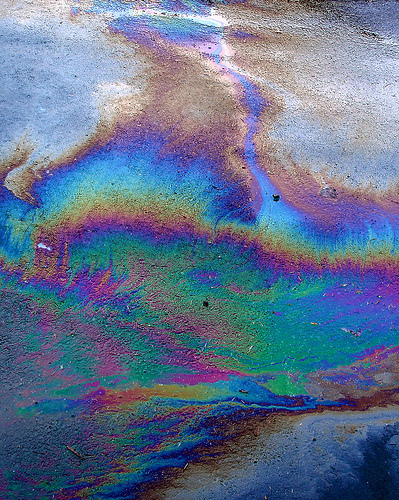 from water have been developed by scientists in the US. Both technologies are based on a special surface treatment based loosely on the famed self-cleaning physics of a lotus leaf. Chris Smith reports...
from water have been developed by scientists in the US. Both technologies are based on a special surface treatment based loosely on the famed self-cleaning physics of a lotus leaf. Chris Smith reports...
Chris - There's a very interesting story which has come out from researchers at Ohio State University who've made this oil water separating sieve which I read with great intrigue. I thought well, that come in useful when you're cooking Sunday dinner because instead of pouring your gravy, which has got oil and fat mixed together, into one of those separating funnels, actually, you could just pour it through a sieve made of this material that they've come up with and it would just separate it for you.
Kat - How does this work then?
Chris - Well, what they were doing was first of all, looking at how they could make self-cleaning mirrors in fact. They were trying to make a surface that would just shed water or shed oil. Then they discovered that you could actually apply this to a thin stainless steel mesh and it would do the same thing. The way it works is first of all they spray onto a stainless steel mesh some particles - effectively sand. It's silica nanoparticles and that makes the surface a bit bumpy. They then layer on top of that a polymer, which is called PDDA because it's got a horribly long, unpronounceable name, but embedded in that polymer are some surfactant molecules. Surfactants are chemicals that break the surface tension of water; they make water much less sticky. The effect of this is that the water will very happily spread out across the surface, but oil hates the surface so it forms little droplets. If you make a mesh of this material and hold it over a jug at a slight angle you can then pour a mixture of water and oil through the sieve. The water leeches straight through and goes into the pot underneath, but the oil runs off sideways. So, you get two pots - one full of oil and one full of water. It's absolutely stunning.
Kat - You're clearly making much classier gravy than I am because I just open the Bisto. Other gravies are available.
Chris - Don't you use the meat juices?
Kat - Well, we're vegetarians.
Chris - Okay, you could still use meat juices. How can you make gravy with no meat juices? It's fantastic!
Kat - We're vegetarians...

Does waving a fan really cool you down?
We put this question to Naked Scientist Ginny Smith...
Ginny - I have used fans before. It certainly feels like it's cooling you down. I imagine it's helping your sweat to evaporate which is going to cause a cooling effect. I mean if you're holding one of those huge fans when you're fanning a queen, you know, those giant ones, I imagine that takes quite a lot of energy. But if it's a little sort of handheld foldout thing, I wouldn't have thought it takes too much energy to fan.
Chris - There is going to be an energy cost to moving the fan as you say. Muscles are only about 20 per cent efficient. So, of all the energy you use, actually moving the fan, 80 per cent of it is being wasted and turning into heat, exactly as Steven is suggesting. So, you've actually got to fan a bit harder and sweat a bit more to compensate for the fanning effect, but it will still cool you down because of evaporation. So, I think there's still a net benefit Steven, but it's going to be a modest one.
Kat - Absolutely fascinating stuff.
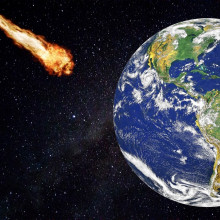
Why do comets look green in photos?
We put Tad's question to astronomer Carolin Crawford...
Carolin - Again, this is such a good question. You look at these wonderful pictures in coffee table astronomy books and you have these multi-coloured swirls, nebulae, comets. They all look fantastically coloured. But when you look at them through the telescope with your naked eye, it's often disappointing - they're sort of grey and whitish. The problem is not with the comet or the nebula. It's with your eye, because the part of the eye that detects faint diffuse substances, these are the rods. They're around the outside of your eye. They're not colour-sensitive. It's the cones at the centre of your eye that are colour-sensitive. And so, if you can see something faint and fuzzy through a telescope, you won't be picking up the colour. And that's why the camera of course doesn't have any of these problems, it picks up all the colours that there are. So it's to do with your eye rather than anything to do with the comet.
Kat - Great question.
Chris - I have noticed that myself when you look at the night sky. If you look out of the corner of your eye the stars are much brighter, and then you look at them and they seem to almost disappear. Especially if it's a star that's a little bit dim in the first place. You can see the star and you look at it and then it's gone. That's why, because you're then focusing it on the centre of your retina where you've got these cones which are pretty good at seeing text on a bright screen, but they're not very good at seeing dark things.
Carolin - Yeah, you're exactly right.

Is it good to listen to music and revise?
We put Nick's question to Naked Scientist Ginny Smith...
Ginny - Well, the studies are quite mixed on this and it depends a lot of what kind of music it is, what kind of person his daughter is, and what she's studying. So, there's a lot of evidence that listening to some music.
Chris - So, what you're saying, if she studies music. It's quite important to be able to listen to music.
Ginny - Well, yes for a start. There's something called the "Mozart effect" where the original finding was that listening to some Mozart before you did a task boosted performance on that task. Its now been debunked. It's not just Mozart. It works with pop music, rock music, pretty much anything. Basically, listening to some music gets you hyped up. It puts you in the right mindset to do lots of different tasks and can help with concentration, memory, all sorts of things. But that's having it on before you start studying. When they've tested out people studying, doing memory tests with music on, most of the time, it does cause detrimental effects to their performance. Sometimes they even found that it's worse when you like the music. But as I say, it does vary from music to music. So, music with lyrics we think is a lot worse than music without lyrics because your brain is kind of getting distracted by the words, trying to follow along with them. And therefore, not concentrating on what you're reading.
Kat - I have to say, I've just been working on writing a book and I've had this playlist that's kind of very minimalist electronic music. It's basically just repetitive bleeps and beats, just quietly going on and I found that's really helped me focus. It sort of shut out all the nonsense.
Ginny - I listen to Sigur Rós because they sing in a language that I don't understand. So again, I don't get distracted by the words. But the other thing is, music can make boring things more fun. So, if you're doing a boring repetitive task.
Kat - Like running.
Ginny - .or data entry or something like that, then music actually can improve your performance because you don't get so bored. And if it's something that you're an expert at already then it can be beneficial. So surgeons often listen to music while performing operations.
Chris - Best email I ever got to the Naked Scientists was this guy in Australia. He wrote in and said, "Dear Naked Scientists, I love listening to your programme on a podcast when I'm in the laboratory dissecting the prostate glands out of Drosophila." But it's sort of what you're saying, isn't it? If there's something which is a repetitive motor task that you're really very good at, very practiced at, but you just have to go through the nuts and bolts of it every time, then actually, having something to occupy that part of your mind means that you're less likely to then get distracted and do something wrong.
Ginny - I think the best everyday example is driving. If you remember back to when you were first learning to change gears, the idea of having music on would've just been way too much of concentrating so hard on what you're doing. But once you've been driving for a year or so, it becomes completely natural and you can listen to music and things perfectly fine at the same time.
Kat - But of course, the only sanctioned listening should be the Naked Scientists on our podcasts.
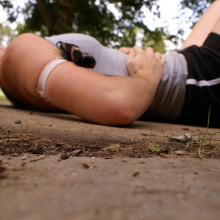
Why do I feel stiff after exercising?
We put this question to Dr Chris Smith...
Chris - Well, I think that the way muscles work is that you have lots of contractile elements or contractile filaments inside a muscle cell. If you look at these down a microscope, what you see are long threads of one particular kind of material called actin and they're linked up to another kind of material called myosin.
On the end of the myosin is this thing called a myosin head and it's like a little ratchet or grappling hook. The myosin crawls along the actin, making the muscle get shorter. And so, every time you contract your muscle, you are pulling these two sets of contractile filaments against each other, relative to each other.
After prolonged exercise, yes there'll be potentially some chemical injury to the muscle because of things like lactic acid, because when you exercise a muscle and it can't get enough blood quickly enough then some of these by-products build up including lactic acid.
But actually, what you do to the muscle is you make some of those fibres tear or break down and become a little bit damaged. This will release various inflammatory chemicals locally and the muscle is well-supplied with nerve fibres that signal pain and damage.
So, the presence of these inflammatory chemicals and the presence of damage to the muscle itself, triggers a little bit of pain, it triggers a little bit of inflammation and that in turn, triggers a little bit of repair to make good.
But the stiffness you experience the next day is because you have stretched all these various elements and as a result, the repair going on is felt as pain so that you know to be a bit more careful with the muscle while it's getting better the next day.
Daniel - Excellent! Thank you very much. It's an honour Dr. Smith.
Kat - I have a question related to this. So, I find I like to do a lot of weightlifting, believe it or not. And I feel fine the day I do it and then the next day. But it's 2 days later, I can't sit down and get up properly. What's going on there?
Chris - I think it's probably a similar thing. Most people, it's worn off by two days though, Kat. I think you're just hopelessly unfit!
Ginny - There's also what people call a runners' high which is when you do these exercise, you get this release of all these hormones from your brain which make you feel really, really good. Some of those hormones actually also act as painkillers so while you've still got those going around your body, they're acting as painkillers. It's not until that's worn off that suddenly, you start sort of noticing how much the exercise actually hurt.
Kat - So, I stop feeling like wonder woman and then I can't put my bra on.
Ginny - Yeah.
Chris - Very good point there, Ginny.
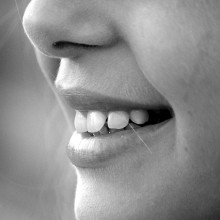
18:08 - You smell happiness in someone's sweat
You smell happiness in someone's sweat
with Ginny Smith, The Naked Scientists
Humans seem to be able to tell if someone is happy or not, just by giving them a  quick sniff! The sweet smell of happiness could also be contagious, making others happy after a quick whiff. Ginny Smith reports on the research, which was published in the journal of the Association for Psychological Science...
quick sniff! The sweet smell of happiness could also be contagious, making others happy after a quick whiff. Ginny Smith reports on the research, which was published in the journal of the Association for Psychological Science...
Ginny - Well, I found a paper that was in Psychological Science this week that showed that if you smell the sweat of someone who's feeling happy, it can actually make you feel happy as well.
Kat - Okay. I do not want to be smelling sweat. What on Earth is this about? How were they doing this?
Ginny - It's one of those studies that you kind of don't want to have signed up for. But they got some men - 9 of them - to watch videos that made them feel either happy, neutral or fearful while they had sweat collecting pads taped under their arms. And then the poor researchers cut up these pads into little sections and gave them to various women to smell and measured various things in those women to see if their mood was influenced.
Kat - Can a smell of a man's sweaty pits tell you whether he was happy or fearful?
Ginny - What's interesting is that, we're not always that good at telling how we feel. So, the researchers wanted to use a few different measures to see if they could detect even kind of subconscious happiness. So, they taped some electrodes to the women's faces to measure which muscles they were moving. So, they could actually measure really tiny facial movements that the women wouldn't necessarily know they were making.
They found that the women who were smelling the sweat of the happy men, showed the sort of happy side of things. so, they moved the muscle that you move when you smile.
Kat - What does this actually tell us though? Does it tell us that happiness is contagious via your smell?
Ginny - Well, it does seem to be, but only in some circumstances. So, there were other ones where they were asked to rate how pleasant the sweat was and there was no correlation. So, it's not that we find happy sweat more pleasant.
So, what they suggest is that these signals that you're getting from the happy sweat is sort of so subconscious that they don't work when you're asked to do anything that involves language processing. So, whether you have to say whether you like something or not, it doesn't work. But with the kind of subconscious tests, it does work. I can see your face. That sounds weird.
Kat - Why would we do this?
Chris - It's just my sweat.
Kat - Smell my pits.
Ginny - So, we know that the olfactory nerves, the nose is very closely linked with emotions, but not very closely linked with language. So, that's why smells can evoke memories and feelings but sometimes it's quite hard to put those into words. People who lose their sense of smell often suffer from depression. But they're not always able to sort of say what they're feeling.
So, we think that there's this really kind of evolutionary ancient link with emotions, that's hard for our kind of more modern language senses to explain. It makes sense when you think of it evolutionarily because a lot of animals communicate with smell. We know that animal scent mark places to leave messages for other animals.
So, the theory is that, that's kind of what we're doing here. And if you were a mother animal who suddenly saw something dangerous, you'd want to communicate that fear as quickly as possible to your cubs. And actually, maybe by smell would be faster than explaining to them that there's something dangerous around.
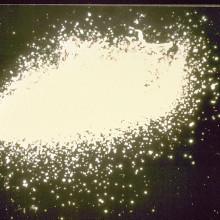
Do we sneeze when we're sleeping?
Kat Arney put Denny's question to Naked Scientist Chris Smith...
Chris - Who sneezed in their sleep? Have you ever done that?
Kat - I don't know.
Ginny - Not that I know of.
Chris - Carolin?
Carolin - I've always woken up if I sneeze while I'm sleeping.
Chris - There you go. That's the crucial answer I reckon because I have definitely done exactly that. I've woken myself up sneezing at night. I think Denny, the answer to your question is that the majority of us wouldn't know if we did sneeze in our sleep and probably, it barely rouses us. And so, as a result, we don't remember it. There's no reason why you shouldn't sneeze in your sleep. What's going on with the sneeze is that you have a circuit in your brain which detects movements or irritation of the lining in your nose. There's a lot of hairs there which if tickled or plucked, will strongly stimulate this reflex and they go back to your brain stem which connects your spinal cord to the top part of your brain where all of the centres which control breathing, coughing, blinking, the amount of saliva and eye secretions and tears you make, all of those things go on there and sneezing and hiccupping is coordinated there as well. All of these functions are preserved in your sleep. You can cough in your sleep. You guard your airway in your sleep to stop yourself choking. So, there's no reason why you shouldn't sneeze in your sleep. I just suspect that most people don't remember that they've done it.
Denny - Well, I've never heard anyone sneezing in their sleep. I've heard people coughing in their sleep.
Chris - I was going to say, how big is your sample size, Denny?
Kat - You need to sleep with some more people to find out.
Denny - I'm not going to answer that question.

Is there an evolutionary reason for rhythm?
We put this question to Ginny Smith and Chris Smith...
Ginny - So, this is a really interesting thing because it's really difficult to study when the evolution of rhythm and dancing, and music and things like that happen because they don't leave behind fossils like tools do. But we think that it's quite an old thing to move together. There's a lot of evidence that if a group of people move together they become bonded. They interact better. They like each other more. So, the theory is that dancing and singing, and all of those sort of movement and music things have evolved to help bond tribes together.
Kat - I saw a really great study. It was about chanting. It was about how groups that chant together, whether it's football chants or religious chants or anything, that people start to move together. They start to breath together. It's a sort of bonding thing.
Ginny - It's the same reason why armies still practice marching up and down even though armies don't march anywhere anymore.
Chris - They do in Korea. You'd see that a lot in Korea.
Ginny - By getting them to march up and down, they all become sort of part of one bigger thing.
Chris - But if you think about it, timing is so critical for everything that the human body does. I mean, your heart has a beat. If I can't form rhythms of speech and breathing patterns and make things like my vocal chords open and close at the right rate, if I can't decode sounds at the right rate, then I can't actually interact with the world. So, timing is absolutely critical.

Could Earth be knocked out of orbit?
We put Rod's question to astronomer Carolin Crawford...
Carolin - The first one that you asked is, what would happen if the earth stopped orbiting? First, let's just look at why the Earth orbits the sun. it's because it's just gradually being pulled around by the gravity of the sun. you know, if the sun wasn't there, the Earth would just continue on in a straight line in space. But because the sun's gravity is there, it just keeps being deflected all the time. so, the minute it stops orbiting, there's nothing left for it to do other than to fall straight into the sun. it doesn't take long to do this sort of back of the envelope calculations suggest it's something over 2 months, less than 100 days anyway. It's just going to fall straight towards the sun. it's going to get hotter as it does - Ginny is looking very dismayed at this news. I'm afraid it's not good news.
Chris - She likes the hot bit, but she doesn't like the fact she only got 100 days to enjoy it.
Carolin - She won't like this hot bit. It gets too hot for life pretty rapidly. Very rapidly, we kind of cross the orbit of Venus, that moves us out of this habitable zone, the safe zone for life around the sun. And by the time you're well into the orbit of Mercury, you're going to start getting temperatures in the surface, thousands of degrees, you're going to get rock melting. And when you get really close to the sun of course, you've got tidal forces so that the front end of the Earth feels a different gravity from the back end of the Earth so it's going to get stretched and squeezed. And kind of the whole Earth would disintegrate. So, that's really what would happen if the Earth stops orbiting. But just to stress, this is a thought experiment. So, we come on to the last question about how safe is our planet from losing that orbit. I mean, if you're going to change the Earth's orbit in that way, you have to change its momentum and that's not easy to do. You have to kind of apply huge external force or you've got to lose a big chunk of the Earth's mass and there's no easy way. I mean, even an asteroid collision would not lose enough mass to stop the Earth from its orbit. So, our planet is really safe from losing orbit. There's one little point talked in the middle there. we talked about the Earth stopping orbiting. The fact is not going to happen. The other thing that was mentioned was, what happens if the earth stops rotating. And again, thought experiment is not going to happen but imagine a great big finger comes out of the sky and just breaks the Earth like that.
Chris - National lottery.
Carolin - That's right. So, imagine it's as really sudden movement and it's going to be a big show. Everything is going to carry on moving sideways. We've all got momentum and the surface of the Earth is spinning. Well, it depends where you are in latitude but probably, where we are is pretty about a thousand kilometres an hour. So, everything is going to continue moving sideways at about a thousand kilometres an hour. So, we would all go flying. Anything lose, not tethered to the ground will go flying. Not just that though. All the oceans would slosh around and go sideways a thousand kilometres an hour, and the air. So, all the atmosphere would carry on going and just like scrape everything off. So, it does getting very serious if that happens.
Ginny - We did an experiment recently where you spin a boiled egg or a raw egg. And if you spin the raw egg and stop it and then let go again, it starts spinning again because of the momentum of the fluid inside. If our imaginary finger stops the earth and then let it go again, would the fluid in the atmosphere, the core and the oceans, would that be enough to get it going again?
Carolin - It would start it moving again, but it would probably still peter out in the long run. I mean, an interesting side effect, if you stopped the Earth spinning of course, you're going to stop perhaps that dynamo effect that drives the Earth's magnetosphere or the Earth's magnetic field. So, the earth would stop having magnetic field as well if you managed to stop all those internal motions.
Chris - Doesn't sound like a very attractive prospect?
Carolin - No. And the other thing is your day and night would last a whole year because instead of - when your day is depends on when the Earth rotates into view of the sun, it would just have to be when that part of the Earth came into view of the sun, as you follow the orbit. So, you've got a 6-month day, a 6-month night. I mean, just think what that would do to your climate changes and the wind patterns.
Chris - Roy Orbison said that, "I could drive all night." It could be a long journey then, wouldn't it?
Carolin - It could be a very long journey, yes.
Kat - But I think, given the likelihood of these things happening is very small, I'm going to put them lower down the list of things that keep me awake at night.
Carolin - Let it stress these are not things that we expect to happen at all, but they're still interesting to just sort of contemplate a bit.

What exercises are good for osteoporosis?
We put this question to Dr Chris Smith...
Chris - It's interesting that Carolin has been talking about space because of course, one of the big risks of going into space and experiencing microgravity or weightlessness, is that you don't have any loading of your bones and astronauts come home with a bone age, equivalent to someone in their 70s and 80s, unless they do something about it. Because we have evolved to live on earth and experience the shocks that gravity throw at us - every time you get out of bed, every time you stand up from a chair, when you step off a curve, when you get in and out of the bath - you are applying a lot of stress vertically along your bones. And your bones have various chemical receptors in them that can detect that stress. In response to that stress, they secrete various factors that trigger the bone to grow more. In this way, the more loading you have on your bones, the more you do, the more dense your bones are going to be. Now, the reason that Linda is interested in osteoporosis I suspect as she's female is that women are at a disadvantage over men because the other thing that makes bones stay strong is the male and female hormones but women rely on oestrogen to keep their bones strong. And once you go beyond the age of the menopause - about age 50 - when the ovaries run out of eggs and you stop producing anymore eggs and therefore, you reduce your oestrogen level, your bones are at greater risk of thinning. And that's why people are advised to take regular load bearing exercise. Not to the extent that you damage your joints or damage your bones by severe exercise, but enough to initiate this stimulus to grow. And this should keep your bones strong. So, very, very severe exercise is not so good, non-load-bearing exercise like swimming is less good, but regular walking is pretty good especially if you're at risk of getting symptoms like osteoporosis.
Kat - I know I'm a big fan of weightlifting. I did hear that weightlifting was actually quite good and I think women are very reluctant to even lift any weights at all.
Chris - Anything that transfers more load through your skeleton is a good thing, but equally, it's important to do things that are within your limits. In fact, there's been a friend of ours who's been on this programme a number of times, Ken Pool who I met at Addenbrooke's Hospital the other day and he's now got a bone scanning technique where they can get their patients to hop on one leg a number of times a day and they can see the bone on the hopped leg getting denser just where they've hopped. You can then get them to do a prescribed amount of exercise which can include hopping because it's great low-bearing exercise and you boost the bone density. He just has published that.

32:34 - Happy Birthday Hubble
Happy Birthday Hubble
with Dr Carolin Crawford, University of Cambridge
This month, the Hubble space telescope turns 25! The Naked Scientists celebrate  its birthday by hearing all about its incredible achievements, from discovering exoplanets to finding evidence that the universe is expanding. Carolin Crawford from the University of Cambridge reports...
its birthday by hearing all about its incredible achievements, from discovering exoplanets to finding evidence that the universe is expanding. Carolin Crawford from the University of Cambridge reports...
Carolin - Well, yes, we had Paul celebrating his 45th birthday this week. Well Paul, you share it with the Hubble Space Telescope. It's been phenomenally successful telescope - the are a number of different things that we've discovered from it, whether it's actually probing the atmospheres of other planets for example. And yet, when it was launched, we barely knew that there were planets surrounding stars. Now, we're measuring what their atmosphere is made of.
That's just one of the many things. It's played a clear pivotal role in so many of these major discoveries. And it's because its got this exquisite detail in its resolution, but the fact you can simultaneously see objects in ultraviolet, the visible and the infrared means you're seeing different processes going on.
So, it's still going and it looks -if it carries on in this health, it could continue for another 5 years, funded up to 2020, so I think it's pretty successful.
Kat - Happy birthday Hubble!
Carolin - Happy birthday Hubble! As I'm someone who spends so much of my time explaining astronomy to the public, one the greatest legacies are the amazing images that really have caught the public's imagination and have inspired I think so many people into an interest in astronomy has been phenomenal. So yes, happy birthday Hubble!
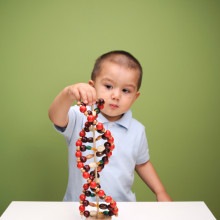
Can chromosomes be repaired?
We put this question to geneticist and Naked Scientist, Kat Arney...
Kat - Angelman syndrome is a really fascinating genetic disorder. I mean obviously if you're a family that's affected by it it's probably more distressing than fascinating. But it's something called an imprinted disorder. So normally, we get one set of all our genes from mum, one set of genes from dad, and they're both pretty much the same. Both copies of the genes are working; the genes that make your hair, your eye colour, all this kind of thing. Both copies, mum and dad's copies, are both working. With certain genes, there are about 100 genes in humans, it's either mum or dad's version that works depending on the gene, and the other one is always switched off. And it's always very stereotypical. At certain genes for example, there's a particular growth factor and that is always dad's version that is on in your cells. Particularly, these genes seem to be relevant in development in very early life. Angelman syndrome is a disorder where this process has gone wrong. Basically, the copy that's meant to be on is not working and there's no backup, whereas if you have two copies of every gene you've got a backup. So, there's been a lot of discussion with some of the new genetic technologies that are coming online, these things called gene editing techniques. There's a very famous one called CRISPR, which listeners might have heard of, where you can actually directly tinker with the chromosomes - you can change bits in the DNA. The problem with something like Angelman syndrome is that it's a developmental disorder. It's something that really starts from when the baby is growing in the womb and continues on into life. It's going to be very hard, even if you could repair the DNA. It's debatable as to whether you could actually repair or turn back the clock and turn back the problems that it's caused with the growing child.
Chris - So, you're saying there are two problems. One is that you've not just got to deal with what is causing this disorder but then you've got to contend with the fact that you've got an accrued problem already under your belt.
Kat - Exactly. So, if you have say, a genetic problem that means you don't make insulin or an enzyme in your pancreas, or an enzyme in your body or your stomach or something like that, maybe you could change the DNA in just those cells and you would start making the enzyme again, and you would be well. But for a lot of the developmental disorders where they've started almost from the fertilised egg and through development, those kinds of things are going to be hard to reverse. Although there are some intriguing examples we probably don't have time to talk about where there may be things that could help. But I think that gene editing for developmental disorders and those big chromosome disorders is going to be tough.

Why do I get sleepy in allergy season?
Kat Arney put John's question to Naked Scientist Chris Smith...
Chris - It's a difficult one this isn't it, because there's a number of things going on here. I know for a fact that when I get a very blocked nose and cloggy throat because of allergy, I don't sleep very well. And so, I think the part of this is that we don't get a good night sleep because you're continuously tossing and turning, sort of clearing your throat, trying to blow your nose and so on. Even when you're asleep you're still being disturbed in your sleep, so you're not getting restful sleep and I think that's part of the equation. The other thing is that how do people manage an allergy problem? Well they take antihistamines because most of that allergy response is the release of histamine in your mucus membranes - eyes, nose, other parts of your body - and the histamine then produces all the symptoms. It causes the itchiness because it winds up the nerve fibres that supply that part of the body. It also causes blood vessels to open up and so-called dilate and become leaky. So, you get swelling of the tissue, and this causes your nose to become all puffy. When you take antihistamines, these are molecules that look like histamine but can't activate the receptors that histamine normally goes on to. So, they block up the histamine effect. Unfortunately, your brain also uses histamine to talk between one set of nerve cells and another. Histamine plays a really important role in arousal and awakening. If you block the action of histamine in the brain then you feel very sleepy. The best antihistamine drugs unfortunately tend to be the ones that are not selective between what the brain needs to do with histamine and what the rest of the body needs to do with histamine. There are antihistamine drugs that can exclude themselves from the brain, but they're not really as good. So, by treating your hay fever or your allergies with an antihistamine, you're actually also sending yourself off to sleep. And I think some of the problem is probably going to be down to that.

Why do we get shivers down our spines?
We put this spine tingling question to Naked Scientist Ginny Smith...
Ginny - Well, this is weird one because those feelings are normally associated with fear, that kind of hair standing on end, cold shivers down your spine.
We understand why we get those when we're afraid, because your hair standing on end in animals would make them look bigger and scarier.
The shiver down your spine, and those kind of tingles you feel, are the release of adrenalin in your body. And adrenalin helps you prepare to either fight off the attacker or run away from it.
So, why do we get those feelings when we hear a beautiful singer or something like that? Well, scientists aren't entirely sure. One theory is that it's something unexpected can cause the same response and that's because often, unexpected things could be dangerous. So, it's a good idea to sort of prepare yourself in case that unexpected thing is danger.
But when we know we're not in a dangerous situation, we can actually re-interpret those bodily feelings as sort of feeling of pleasure. So, when it's studied, this kind of tingles often come in music when there's a sudden change in the tempo or the volume that maybe you weren't expecting. And you get that kind of fear response but you know you shouldn't be scared. So actually, it's quite enjoyable, in the same way that riding a roller coaster or that kind of first brush of the hand with a potential romantic partner. You can get that same sort of feeling. It's fear but not fear, and we actually quite enjoy it!
Kat - At the frisson of excitement. Does everyone get that?
Chris - Only when I'm listening to this show!
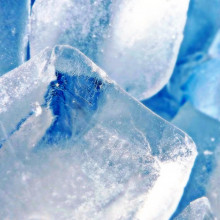
How do you make ice cubes clear?
We put this question on ice for Naked Scientist Chris Smith...
Chris - I'm presuming he's having a cocktail party and I'm looking forward to my invitation if I can solve this one for you. The answer to why ice is not clear first of all helps you to understand what you need to have clear ice. Snow is ice but it of course looks white, but ice on a pond is transparent. Why the difference? Well, if you look at the difference between snow in ice and a pond, snow particles are lots of tiny ice crystals. The crystal that you see on the surface of a pond that you can see through is almost a single crystal of ice. If you have lots of tiny crystals, when light goes into the crystals then it gets reflected and it gets bounced about all over the place and all of the different colours of light come back towards you and that's why actually, it looks white because when you mix all those colours together, you get white light. So, when you have an ice cube that's crazed which is not clear, the reason it's not clear is because there are lots of little, either fractures in the ice cube or more commonly, lots of little crystals that have all formed to produce one giant ice cube. How then do you end up with a single ice cube that's a single crystal which is what you need in order to not disrupt the path of the light, like snow, does so it's clear? You need to do what's called nucleate the formation of the ice cube from one position only. In fact, you might not believe it, but when you're making a jet engine, you need to do exactly the same thing because when you make the metal parts of the engine, the strength is in growing your engine parts as one single metal crystal. So, you pour molten metal into a mould and then you drop in, or you initiate, one tiny form of crystal into one place and the whole thing then crystallises following the same crystal structure. So, what a pub will do or someone who's got an ice making machine, usually, you've got a stainless steel tube or something, which will conduct heat really well, you make that cold. You have a central core which is also cooled and this way, you've got lots of surface area in contact with ice. You drop the temperature really fast, but it's going to start the freezing process around that central cooling probe and then the crystal will grow out from there towards the margins - the edge - and therefore, you're more likely to have single crystal, and therefore, more likely to have nice clear ice.
Kat - So, this is why the ice cubes in pub drinks, those kind of their sort of circular shaped. They've got a hole in the middle.
Chris - Yeah, because that way, you've got as much contact of the thing that can take the energy away from the water, the metal, as possible and this drops the temperature nice and quick and that's how you make ice cubes fast but the by-product of that is you generally get them starting the freezing process in one place. They nucleate from one place, you get one crystal, nice clear ice.
Kat - So Kevin's answer is basically buy an ice maker or buy a pub.
Chris - No, just buy a pub.
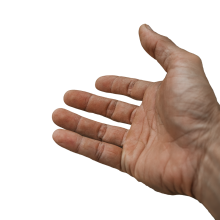
Why are people left-handed?
We put this question to Naked Scientist Chris Smith...
Chris - Well, 90% of the population are right-handed and 10% therefore, left-handed. There is some evidence that this runs in families. If you look at families that have left handers in them, you can model this and show that there is some evidence that there is a genetic influence. But researchers have tried very hard using some really powerful genetic techniques and they have not yet found any evidence of a gene that causes handedness. So, we think if anything, it's probably a cluster of genes that work in a certain way, rather than an individual gene that either makes you left-handed or not. It probably biases the likelihood of you becoming left-handed rather than absolutely determining left-handedness. What actually is left-handedness or right-handedness equally? Well, if you look at the brain of a human being, you'll see that it's asymmetrical. The left hand side of the brain is actually differently developed than the right hand side. In fact, we know that language function maps onto the left hand side of the brain in the majority of the population.
That makes your hemisphere dominant on that side and because the left hand side of the brain controls the right hand side of the body and vice versa, you end up with your right hand being your dominant hand because it's being controlled by your dominant hemisphere. Why it should've happened like that? We don't know, but it's almost certainly something to do with the evolution of language. And really interestingly, if you look back in history, even cave people from 50,000 to 100,000 years ago, researchers at the University of Montpellier in France have done this, you can show that they almost certainly were equally handed in the same way we are. The evidence for their study was, they went to a primary school and they gave school children a blowpipe and said to them, "Blow some paint onto a wall using your hand as a stencil and you can get the picture." You hold the blow pipe in one hand, you blow hard, use your other hand up against the wall as a stencil. What do you get? Well, if you do this with the school children, you find about 90% of the hands that you get on the wall are left hands. Why? Because you're holding the blow pipe with your dominant right hand because it's easier to control it and get the picture you want. If you look at real cave paintings where cavemen have done exactly the same thing, you'll see the same ratios. So, we're pretty happy that cave people who are living tens of thousands of years ago also had this brain asymmetry, also had this handedness, and this is probably going hand in hand - excuse the pun - with the evolution of language.









Comments
Add a comment